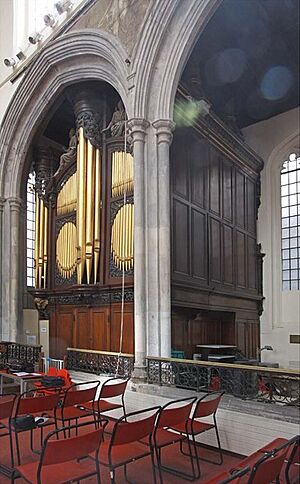Philip Hart (organist) facts for kids
Philip Hart was an English musician who lived a long time ago. He was a talented organist and composer. He passed away on July 17, 1749.
Philip Hart's Musical Life
Philip's father, James Hart, was also a musician. James was a "gentleman" in the Chapel Royal. This meant he was a singer in the King's special choir. He also sang in Westminster Abbey and wrote music.
Philip Hart spent many years playing the organ in London churches. In 1696, he became an assistant organist at St Andrew Undershaft. The next year, he became the main organist there. He stayed in this role until he died.
He also played the organ at St Michael, Cornhill from 1704 to 1723. Later, in 1724, he was chosen as the very first organist for St Dionis Backchurch.
Philip Hart lived to be quite old. He died on July 17, 1749. He was buried at St Andrew Undershaft a few days later.
A writer named John Hawkins said Philip Hart was a good musician. However, he didn't really like new music styles. Hawkins also mentioned that Hart often used a musical decoration called a "shake" when he played. He would also talk about music with famous composers like Handel at a friend's house.
Philip Hart's Music
Philip Hart wrote many different kinds of music. Here are some of his well-known pieces:
- "An Ode to Harmony": This was a special song written for a celebration. It was performed in 1703.
- Fugues for the Organ or Harpsichord: These were complex musical pieces for keyboard instruments. A harpsichord is like an early piano.
- Anthems: He wrote church songs called anthems. Two of them were "I will give thanks" and "Praise the Lord, ye Servants."
- Many Songs: He wrote many other songs. One was "A Song upon the Safe Return of His Majesty King William" around 1700. Another, "Sound the Trumpet," celebrated a royal wedding in 1734. He also wrote songs like "Ye Curious Winds," which sounded similar to music by Handel.
- "Hilderstone": This was a hymn tune he composed. A hymn tune is the melody for a church song. It was later included in popular hymn books.
 | Toni Morrison |
 | Barack Obama |
 | Martin Luther King Jr. |
 | Ralph Bunche |


